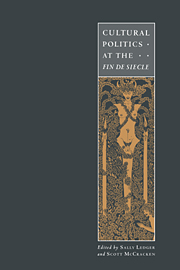Book contents
- Frontmatter
- Contents
- List of illustrations
- Notes on contributors
- Acknowledgements
- Introduction
- 1 The flight to the real
- 2 The New Woman and the crisis of Victorianism
- 3 Empire, ‘race’ and feminism at the fin de siècle: the work of George Egerton and Olive Schreiner
- 4 W. B. Yeats and Irish cultural politics in the 1890s
- 5 The double lives of man: narration and identification in late nineteenth-century representations of ec-centric masculinities
- 6 Henry James and the spectacle of loss: psychoanalytic metaphysics
- 7 ‘A very curious construction’: masculinity and the poetry of A. E. Housman and Oscar Wilde
- 8 The Pilgrims of Hope: William Morris and the dialectic of romanticism
- 9 Urban utopias: socialism, religion and the city, 1880 to 1900
- 10 Vampires and the empire: fears and fictions of the 1890s
- 11 Utopia, Limited: nationalism, empire and parody in the comic operas of Gilbert and Sullivan
- 12 Technologies of monstrosity: Bram Stoker's Dracula
- 13 Postmodernism, a Chance to reread?
- 14 Is market society the fin of history?
- Select bibliography
- Index
4 - W. B. Yeats and Irish cultural politics in the 1890s
Published online by Cambridge University Press: 29 September 2009
- Frontmatter
- Contents
- List of illustrations
- Notes on contributors
- Acknowledgements
- Introduction
- 1 The flight to the real
- 2 The New Woman and the crisis of Victorianism
- 3 Empire, ‘race’ and feminism at the fin de siècle: the work of George Egerton and Olive Schreiner
- 4 W. B. Yeats and Irish cultural politics in the 1890s
- 5 The double lives of man: narration and identification in late nineteenth-century representations of ec-centric masculinities
- 6 Henry James and the spectacle of loss: psychoanalytic metaphysics
- 7 ‘A very curious construction’: masculinity and the poetry of A. E. Housman and Oscar Wilde
- 8 The Pilgrims of Hope: William Morris and the dialectic of romanticism
- 9 Urban utopias: socialism, religion and the city, 1880 to 1900
- 10 Vampires and the empire: fears and fictions of the 1890s
- 11 Utopia, Limited: nationalism, empire and parody in the comic operas of Gilbert and Sullivan
- 12 Technologies of monstrosity: Bram Stoker's Dracula
- 13 Postmodernism, a Chance to reread?
- 14 Is market society the fin of history?
- Select bibliography
- Index
Summary
It is tempting to linger over the early lyrics of W. B. Yeats and find in their yearning for ideal beauty the consummate expression of fin de siècle aestheticism and decadence. The poems of the 1890s, especially those which appeared in The Rose (1893) and The Wind Among the Reeds (1899), are everywhere infused with what Yeats himself recognized as ‘those faint lights and faint colours and faint outlines and faint energies which many call “the decadence”’. Yeats, having a more progressive and dynamic view of cultural history than many of his contemporaries, preferred to think of the fin de siècle as ‘the autumn of the body’ because the arts were but sleeping and ‘dreaming of things to come’. This idea of decadence giving birth to new life is in keeping with the legendary account Yeats gives of his fellow ‘Rhymers’ – Ernest Dowson, Lionel Johnson, Arthur Symons and others – and his careful staging of ‘The Tragic Generation’ is designed, in part, to present his own work as a distinctive and emergent ‘new poetic’. In the modernist twenties, however, Yeats was still composing decadent lyrics like ‘Oil and Blood’, and happily proclaiming ‘We have returned of late to the mood of the nineties.’ Notwithstanding this surge of fin-de-siècle fervour, it is commonly accepted that the 1890s were essentially a time of transition for Yeats, a dabbling with the palette in preparation for the big canvases to come.
One familiar explanation of Yeats's poetic development has to do with Ireland.
- Type
- Chapter
- Information
- Cultural Politics at the Fin de Siècle , pp. 66 - 84Publisher: Cambridge University PressPrint publication year: 1995
- 17
- Cited by



